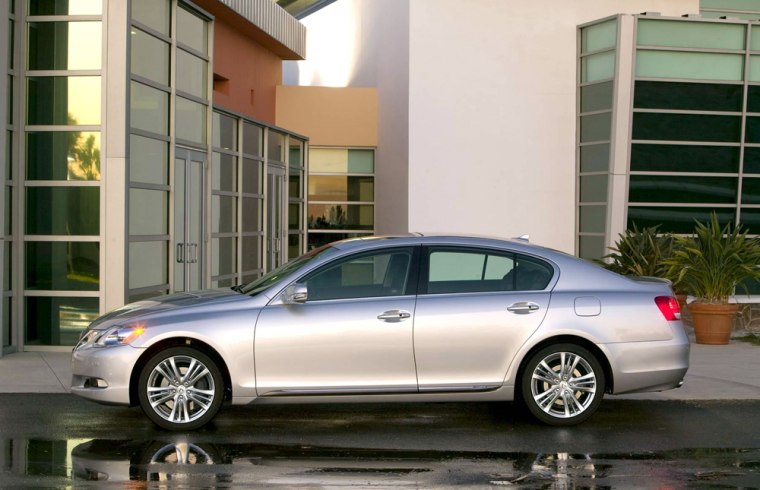Hybrids have a well-founded reputation for being sluggish, but some are downright powerful.
Most hybrids rely on small, underpowered gasoline engines paired with electric motors — great for reducing fuel consumption; not so great when it comes to acceleration. A new generation of sporty hybrids is in the works and ought to give the segment an image makeover after coming to market. But those who require a vehicle with gutsy acceleration need not put off buying a hybrid until then: Some models already on sale get better-than-average gas mileage without being slowpokes.
The fastest hybrids on the market, highlighted in the accompanying slideshow, are rolling compromises. Measured against non-hybrid competitors, they’re not necessarily the speediest. And measured against all hybrids, they’re not the most fuel efficient. But for drivers who want a vehicle that balances power with fuel efficiency, they’re worth considering.
The five-passenger Lexus GS 450h — which tops our ranking of the most powerful hybrids available — is as quick as the much smaller and lighter Porsche 911.
General Motor’s new full-size SUVs, including the Cadillac Escalade Hybrid, Chevrolet Tahoe Hybrid and GMC Yukon Hybrid, also made the list. They offer plenty of pep on the pavement and unprecedented towing capability for hybrids. (See the full list by clicking on the “slide show” link below).
One drawback to all hybrids is that they cost more than their conventional counterparts. The models on our list are $2,780 to $32,000 more than comparable non-hybrid models from the same manufacturer.
The extra expense is for the added technology. Conventional vehicles have only a gasoline engine. Hybrids have the gasoline engine along with one or more electric motors connected to a battery pack that automatically recharges itself.
But with rising gas prices, even the least fuel-efficient hybrids with the steepest premiums over comparable conventional models have become more appealing — especially for those who don’t want to be sluggards on the road for the sake of better fuel economy.
Take for example the fastest hybrid currently on the market based on 0-60 mph acceleration time: the $55,800 Lexus GS 450h. An electric motor mated to its V6 engine increases fuel efficiency while actually adding power.
With a 0-60 mph time of 5.2 seconds, the GS 450h is speedy enough to be a match for the Porsche 911. Yet it manages class-leading fuel economy for a luxury sedan of its size: 22 miles per gallon in the city, 25 mpg on the highway.
Hybrids tend to be most efficient at slower speeds, where their electric motors can do most of the work to propel the vehicle.
But the hybrid GS 450h is half a second quicker from 0 to 60 mph than its non-hybrid V8-powered twin, the GS 460, in addition to being 15 percent more fuel efficient in combined city/highway driving.
When most people think of a hybrid vehicle, a super-high-mileage model like the Toyota Prius usually comes to mind. Currently the top-selling hybrid in the United States by a wide margin, the Prius is nonetheless underpowered even by economy car standards, a sacrifice necessary to help achieve its lofty 46 miles per gallon.
Sluggish as it is, the Prius would be even less zippy without its electric motor, which boosts the car’s puny 76-horsepower gasoline engine up to the equivalent of 110 horsepower.
So how can the same mechanical wizardry used to create the most fuel-efficient vehicles on the market also augment acceleration and performance? According to Marc Ross, a professor of physics at the University of Michigan, drivers need look no farther than the electric power source, which supplies lots of low-speed power (called torque) to augment the gasoline engine.
“That is probably the technology’s most important application,” Ross says.
GM is another manufacturer putting hybrid technology to good use in powerhouse vehicles. The Cadillac Escalade Hybrid, Chevrolet Tahoe Hybrid and GMC Yukon Hybrid incorporate electric motors into an ingenious transmission that helps boost the fuel economy of the vehicles’ robust V8.
The 8.3 second 0-60 mph time for these heavy, seven-passenger vehicles isn’t too shabby.
But what’s more impressive is the towing capability their hybrid powertrains offer — 6,200 pounds.
Just as Lexus uses hybrid technology to boost performance in its GS 450h sport sedan, GM uses it to preserve the rugged towing, hauling and off-road capabilities its full-size SUVs are known for, while improving fuel economy by 31 to 50 percent over the conventional models.
The Cadillac Escalade, Chevy Tahoe and GMC Yukon Hybrids get an estimated 21 mpg city/22 mpg highway with two-wheel drive and 20 mpg city/20 mpg highway with optional four-wheel drive. That would save between $881 and $1,642 in annual fuel costs, according to the EPA’s online fuel-cost calculator, depending on which conventional version you compare it to.
As with all hybrids, GM’s hybrid SUVs cost more than their conventional counterparts, between $12,660 and $15,230, depending on equipment level.
